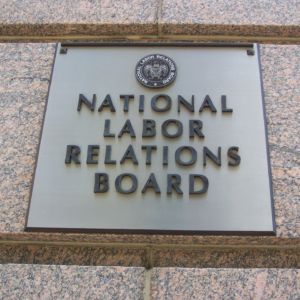Last November, Americans voted for change from the previous eight years. The economy was perceived to remain sluggish, wages stagnated and businesses felt squeezed by their own government. Among all the new government regulations and mandates that employers faced on multiple fronts, one of the worst anti-business offenders was the National Labor Relations Board.
President Obama’s NLRB was stacked with Big Labor allies and its decisions benefited them time and again. From rulings permitting micro unions — small, hand-selected groups of employee units — to permitting the disclosure of employee personal information to union organizers to expediting the election timeframe to ambush workers, Obama’s labor board took away worker freedoms and handed them to special interests in the labor movement.
One such decision was establishing the new joint employer standard, which turned the established franchise model on its head and changed decades of labor law. This standard, which was modified in 2015 by the Browning-Ferris ruling, marked a drastic change concerning business liability and workplace law violations.
Before 2015, the standard was that employers were responsible only for those employees whom they had direct authority over in the workplace. However, the new standard established a policy where liability was expanded to businesses that did not have direct purview over workplace employees.
This confusing and vague regulation had the potential to cripple small businesses, particularly franchises, as parent companies would now be faced with liability of their franchisee’s employees.
This confusion created a difficult business environment for many local employers, such as franchisees, raising questions whether investment was wise and sound. One factor that differentiates franchises is that they provide ready-made opportunities for entrepreneurs who can work with established brands and bring jobs and economic investment to a community.
According to a September 2016 study by the International Franchise Association, franchises generate $674 billion in economic impact and provide more than 7.6 million jobs. For such large economic drivers, it is important that the government create an environment encouraging growth and hiring, not burdensome and confusing regulations that impede increases in employment and market expansion.
That is why Republicans and Democrats alike have spoken out about the new joint employer standard. In an era where there are few examples of bipartisanship, elected officials on both sides of the aisle — such as Democratic Reps. Collin Peterson of Minnesota, Henry Cuellar of Texas and Jim Costa of California, and Republicans Dave Brat of Virginia, Tom MacArthur of New Jersey and Andy Barr of Kentucky — have come together to denounce this threat to local ownership.
They join many in the business community who were pleased to see that the Department of Labor recently announced that it was withdrawing its informal guidance on new joint employment standards. This important measure clarifies the law’s current interpretation and returns to the pre-2015 status in a welcome change, which demonstrates that the new administration is committed to working with employers, both big and small, to ensure that they are positioned to succeed.
While this progress should be heartening for American workers and businesses alike, more must be done to roll back the NLRB’s joint employer standard and other labor rulings by the Obama NLRB. The Labor Department’s decision on the new joint employer standard is welcomed as it shows there are policies that merit both Republican and Democratic consensus. But to be clear, more work needs to be done to make certain union leaders are not dictating our country’s labor policies and the interests of workers are placed above all else.

